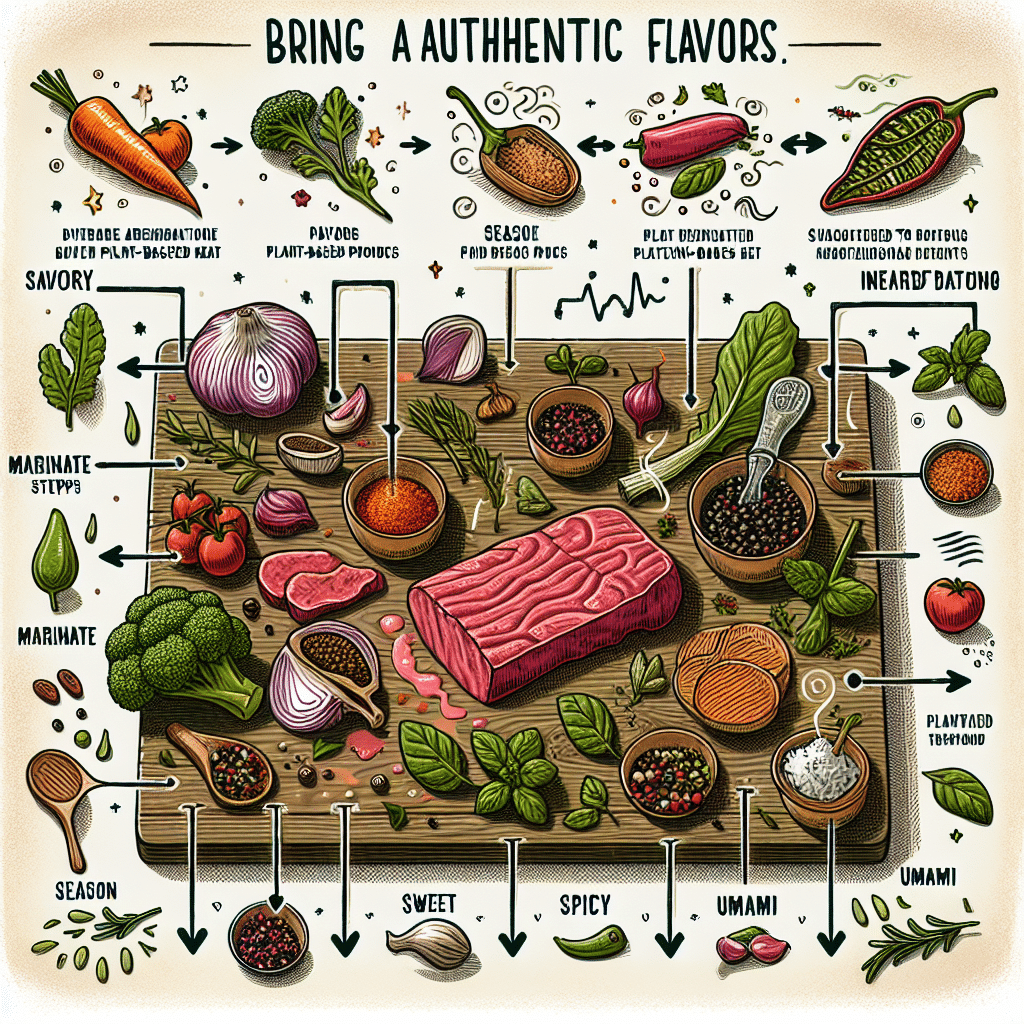Plant-based Meat Taste: How to Bring Authentic Flavors
-
Table of Contents
- Plant-Based Meat Taste: Mastering Authentic Flavors
- Understanding the Flavor Profile of Meat
- Key Ingredients in Plant-Based Meat Flavoring
- Techniques for Developing Meaty Flavors
- Case Studies: Success Stories in Plant-Based Meat Flavors
- Consumer Acceptance and Taste Preferences
- Challenges and Future Directions
- Conclusion: The Future of Flavor in Plant-Based Meats
- Discover ETChem’s Protein Products
Plant-Based Meat Taste: Mastering Authentic Flavors
The rise of plant-based meats has been meteoric in recent years, with consumers increasingly seeking alternatives to animal products for health, environmental, and ethical reasons. However, the success of these products hinges on one critical factor: taste. Achieving the authentic flavors of traditional meat is a complex challenge that food scientists and chefs have been tackling head-on. This article delves into the strategies and innovations that are making plant-based meats indistinguishable from their animal-based counterparts.
Understanding the Flavor Profile of Meat
Before diving into the creation of plant-based meat flavors, it’s essential to understand what makes meat taste the way it does. Meat flavor is a symphony of tastes and aromas, a combination of the following elements:
- Fats and oils that carry flavors and contribute to mouthfeel
- Amino acids and sugars that create complex Maillard reaction products when heated
- Organic compounds that develop during the cooking process
- Trace elements and minerals that provide subtle taste nuances
Replicating these components in plant-based meats requires a multifaceted approach, blending science with culinary artistry.
Key Ingredients in Plant-Based Meat Flavoring
To mimic the taste of meat, plant-based products often rely on a variety of ingredients:
- Proteins: Soy, pea, and wheat proteins are common bases that provide texture and protein content.
- Fats: Coconut oil, canola oil, and other plant oils replicate the richness of animal fats.
- Flavorings: Natural and artificial flavorings are used to mimic the specific tastes of different meats.
- Heme: This iron-containing molecule, particularly soy leghemoglobin, is crucial for replicating the bloody taste of beef.
- Umami agents: Ingredients like yeast extract, mushrooms, and fermented products enhance the savory depth.
Each of these ingredients plays a role in creating a convincing meat flavor in plant-based alternatives.
Techniques for Developing Meaty Flavors
Creating a meat-like flavor profile in plant-based products involves several techniques:
- Maillard Reaction: Heating proteins and sugars to produce complex flavor compounds.
- Marination: Infusing the plant proteins with a blend of spices, herbs, and umami-rich ingredients.
- Extrusion: A process that cooks and shapes the product, affecting texture and flavor development.
- Fermentation: Using microorganisms to produce flavor compounds and improve digestibility.
These techniques are crucial for developing the depth and complexity associated with meat flavors.
Case Studies: Success Stories in Plant-Based Meat Flavors
Several companies have made significant strides in creating plant-based meats that satisfy even the most discerning palates:
- Impossible Foods: Known for its use of heme to replicate the taste of beef, Impossible Foods has become a leader in the industry.
- Beyond Meat: By focusing on the texture and flavor of its products, Beyond Meat has successfully captured a substantial market share.
- Quorn: Utilizing mycoprotein, Quorn products offer a unique taste and texture that appeals to many consumers.
These companies have set the bar high, proving that plant-based meats can be both delicious and environmentally friendly.
Consumer Acceptance and Taste Preferences
Consumer acceptance is pivotal for the success of plant-based meats. Taste preferences vary widely, but studies show that many consumers are open to plant-based options if they meet certain criteria:
- Similar taste and texture to animal-based meats
- Health benefits without compromising flavor
- Convenience and availability
- Positive environmental impact
Meeting these expectations is essential for plant-based meats to continue their growth trajectory.
Challenges and Future Directions
Despite the progress made, challenges remain in the quest for the perfect plant-based meat flavor:
- Replicating the complexity of specific meat cuts
- Scaling production while maintaining quality
- Continued innovation in ingredients and processing techniques
The future of plant-based meats is bright, with ongoing research and development paving the way for even more authentic flavors.
Conclusion: The Future of Flavor in Plant-Based Meats
The journey to create plant-based meats that rival the taste of animal products is an ongoing endeavor. Through a combination of scientific innovation, culinary expertise, and consumer feedback, the industry is making significant strides. As technology advances and tastes evolve, the gap between plant-based and animal-based meats continues to narrow, promising a future where sustainable and delicious meat alternatives are the norm.
Discover ETChem’s Protein Products
For those interested in the development of plant-based meats or other protein-rich products, ETChem offers a range of high-quality protein ingredients. Their extensive selection of collagens, including marine, fish, bovine, and chicken collagens, provides the perfect foundation for creating nutritious and flavorful food products. With ETChem’s commitment to quality and customer satisfaction, you can trust that your protein needs will be met with the highest standards.
About ETChem:
ETChem, a reputable Chinese Collagen factory manufacturer and supplier, is renowned for producing, stocking, exporting, and delivering the highest quality collagens. They include marine collagen, fish collagen, bovine collagen, chicken collagen, type I collagen, type II collagen and type III collagen etc. Their offerings, characterized by a neutral taste, instant solubility attributes, cater to a diverse range of industries. They serve nutraceutical, pharmaceutical, cosmeceutical, veterinary, as well as food and beverage finished product distributors, traders, and manufacturers across Europe, USA, Canada, Australia, Thailand, Japan, Korea, Brazil, and Chile, among others.
ETChem specialization includes exporting and delivering tailor-made collagen powder and finished collagen nutritional supplements. Their extensive product range covers sectors like Food and Beverage, Sports Nutrition, Weight Management, Dietary Supplements, Health and Wellness Products, ensuring comprehensive solutions to meet all your protein needs.
As a trusted company by leading global food and beverage brands and Fortune 500 companies, ETChem reinforces China’s reputation in the global arena. For more information or to sample their products, please contact them and email karen(at)et-chem.com today.





